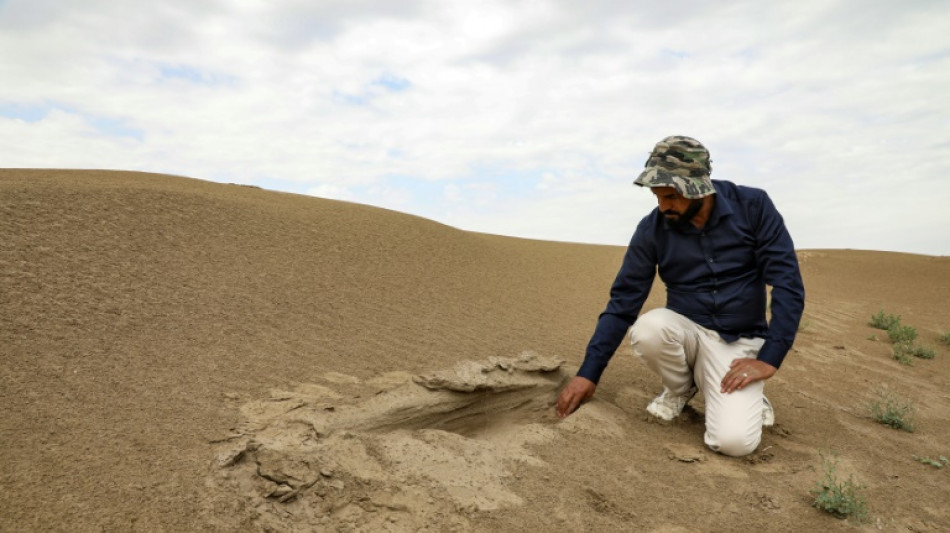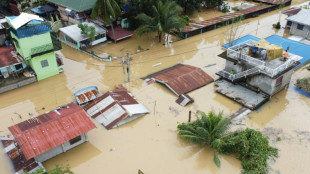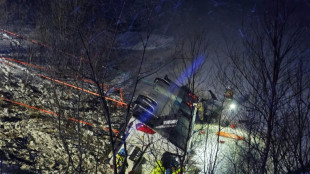
-
 India lose five after Smith's heroics put Australia in charge of 4th Test
India lose five after Smith's heroics put Australia in charge of 4th Test
-
'Dangerous new era': climate change spurs disaster in 2024

-
 Fritz motivated for Slam success after low-key off-season
Fritz motivated for Slam success after low-key off-season
-
Move over Mercedes: Chinese cars grab Mexican market share

-
 Zverev aiming to challenge Sinner for top ranking
Zverev aiming to challenge Sinner for top ranking
-
N. Korean soldier captured in Russia-Ukraine war: Seoul

-
 Inspired Tsitsipas looking to 'refresh, regroup' in Australia
Inspired Tsitsipas looking to 'refresh, regroup' in Australia
-
India announces state funeral for former PM Manmohan Singh

-
 Seahawks edge Bears to boost NFL playoff hopes
Seahawks edge Bears to boost NFL playoff hopes
-
Rohit out cheaply as Smith heroics put Australia in charge of 4th India Test

-
 Thunder NBA win streak at nine as Shai ties career high with 45
Thunder NBA win streak at nine as Shai ties career high with 45
-
India announces state funeral for ex-PM Manmohan Singh

-
 Japan govt approves record budget for ageing population, defence
Japan govt approves record budget for ageing population, defence
-
Japanese shares gain on weaker yen after Christmas break

-
 Smith's 140 puts Australia in control of 4th Test against India
Smith's 140 puts Australia in control of 4th Test against India
-
South Korea's acting president faces impeachment vote

-
 Fleeing Myanmar, Rohingya refugees recall horror of war
Fleeing Myanmar, Rohingya refugees recall horror of war
-
Smith century puts Australia in control of 4th Test against India

-
 Israeli strikes hit Yemen as Netanyahu fires warning
Israeli strikes hit Yemen as Netanyahu fires warning
-
Peru ex-official denies running Congress prostitution ring

-
 Australia's Smith reaches 34th Test century
Australia's Smith reaches 34th Test century
-
NHL Red Wings fire Lalonde and name McLellan as head coach

-
 InterContinental Hotels Group PLC Announces Transaction in Own Shares - December 27
InterContinental Hotels Group PLC Announces Transaction in Own Shares - December 27
-
Relief Therapeutics Provides Update on Potential Transaction with Renexxion

-
 Australian bushfire burns area the size of Singapore
Australian bushfire burns area the size of Singapore
-
Injured Halep withdraws from Australian Open

-
 Liverpool power seven points clear, Man Utd crash at Wolves
Liverpool power seven points clear, Man Utd crash at Wolves
-
Two killed in treacherous Sydney-Hobart yacht race

-
 Leaders Liverpool survive Leicester scare to go seven points clear
Leaders Liverpool survive Leicester scare to go seven points clear
-
Membership of UK's anti-immigration Reform party surpasses Conservatives

-
 US stocks take a breather, Asian bourses rise in post-Christmas trade
US stocks take a breather, Asian bourses rise in post-Christmas trade
-
Two dead in treacherous Sydney-Hobart yacht race

-
 Amorim warns of 'long journey' ahead for miserable Man Utd
Amorim warns of 'long journey' ahead for miserable Man Utd
-
Three dead, four injured in Norway bus accident

-
 Russia missile suspected in Azerbaijani plane crash, Moscow warns against 'hypotheses'
Russia missile suspected in Azerbaijani plane crash, Moscow warns against 'hypotheses'
-
Man Utd fall to Wolves as Fernandes sees red

-
 Fernandes sent off as Man Utd crash at Wolves, troubled Man City held by Everton
Fernandes sent off as Man Utd crash at Wolves, troubled Man City held by Everton
-
'Logical' that fatigued Spurs are faltering - Postecoglou

-
 Manmohan Singh: technocrat who became India's accidental PM
Manmohan Singh: technocrat who became India's accidental PM
-
Panama president rules out talks with Trump over canal threat

-
 India's former PM Manmohan Singh dies aged 92
India's former PM Manmohan Singh dies aged 92
-
Acid risk contained in deadly Brazil bridge collapse

-
 Azerbaijan believes missile downed plane, Russia warns against 'hypotheses'
Azerbaijan believes missile downed plane, Russia warns against 'hypotheses'
-
Chelsea stunned by Fulham in blow to Premier League title hopes

-
 Finns probe ship from Russia for 'sabotage' of cables
Finns probe ship from Russia for 'sabotage' of cables
-
Troubled Man City held by lowly Everton, Chelsea title bid rocked

-
 Paterson, Bosch give South Africa edge over Pakistan in first Test
Paterson, Bosch give South Africa edge over Pakistan in first Test
-
Oil leak in Peru tourist zone triggers 'environmental emergency'

-
 Mozambique post-election violence kills 125 in three days: NGO
Mozambique post-election violence kills 125 in three days: NGO
-
Finns probing ship from Russia for 'sabotage' of cables


Iraq's ancient treasures sand-blasted by climate change
Iraqi archaeological marvels that have survived millennia and the ravages of war now face a modern threat: being blasted and slowly buried by sandstorms linked to climate change.
Ancient Babylonian treasures, painstakingly unearthed, are slowly disappearing again under wind-blown sand in a land parched by rising heat and prolonged droughts.
Iraq, one of the countries worst-hit by climate change, endured a dozen major sandstorms last year that turned the sky orange, brought daily life to a halt and left its people gasping for air.
When the storms clear, layers of fine sand cover everything -- including the Sumerian ruins of Umm al-Aqarib, "the Mother of Scorpions", in the southern desert province of Dhi Qar.
Sandstorms have slowly begun to reverse years of work there to unearth the temples' terracotta facades and many priceless artifacts, said archaeologist Aqeel al-Mansrawi.
Archaeologists in Iraq have always had to shovel sand, but now the volumes are growing.
After a decade of worsening storms, sand at Umm al-Aqarib now "covers a good part of the site", that dates back to around 2350 BC and spans more than five square kilometres, he said.
In the past, the biggest threat was looting of antiquities at the ruins, where pottery fragments and clay tablets bearing ancient cuneiform script have been discovered.
Now the changing weather and its impact on the land, especially creeping desertification, spell an additional threat to ancient sites all across southern Iraq, said Mansrawi.
"In the next 10 years," he said, "it is estimated that sand could have covered 80 to 90 percent of the archaeological sites."
- 'Weathering and disintegration' -
The fabled land between the Tigris and Euphrates rivers hosted some of the world's earliest civilisations, the remains of which are under threat in modern-day Iraq.
The oil-rich country is still recovering from decades of dictatorship, war and insurgency and remains plagued by misrule, corruption and widespread poverty.
Compounding its woes, Iraq is also one of the five countries most impacted by some effects of climate change, including drought, says the United Nations.
Upstream dams in Turkey and Iraq have reduced the flow of its big rivers, and more water is wasted by Iraq's ancient irrigation system and outdated farming practices.
Summer temperatures topping 50 degrees Celsius (122 degrees Fahrenheit) now often batter Iraq where droughts have parched agricultural areas, driving farmers and pastoralists into crowded cities.
"The sandstorms became more frequent, the wind became dustier and the temperatures increase," said Jaafar al-Jotheri, professor of archaeology at Iraq's Al Qadisiyah University.
"The soil has become more fragile and fragmented because of the lack of vegetation and roots," he explained.
As more farmers flee the countryside, "their land is left behind and abandoned and its soil becomes more exposed to the wind".
Winds pick up "more sediment fragments that reach the archaeological sites", Jotheri said, adding that the "sand and silt cause physical weathering and disintegration of buildings".
- 'Containing the sand dunes' -
The problem is compounded by salinisation, said Mark Altaweel, professor of Near East Archaeology at University College London.
During extreme heat, he explained, water on the land surface evaporates so quickly that the soil does not reabsorb the crystals, which are left behind as a crust.
"When it's hyper dry, the water quickly evaporates and that leaves that salt residue," he said, adding that "you can see it on the bricks".
Jotheri said that salt in the earth carried by sandstorms causes "chemical weathering for archaeological buildings".
Iraqi authorities insist they are tackling the complex and multi-layered problem.
The government "is working to contain the sand dunes", said Chamel Ibrahim, director of antiquities of Dhi Qar province.
He pointed to a plan to plant a "green belt" of trees at a cost of about $3.8 million.
But Jotheri voiced doubt, saying that to keep the vegetation alive, "you need a lot of water".
When it comes to climate change, he said, "we are the country facing the most and acting the least. We are at the bottom of the list in terms of acting against climate change."
J.Williams--AMWN

